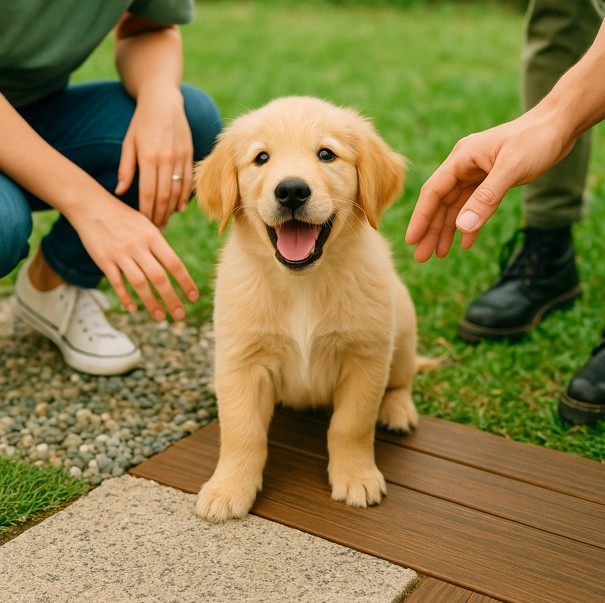The 7-7-7 Rule was developed by dog behaviorist Pat Hastings as a framework to help puppies gain healthy exposure to the world during their most formative stage - the first seven weeks of life.
The idea is simple:
By the time your puppy is seven weeks old, they should have experienced at least:
These early experiences teach puppies that the world is safe, interesting, and full of variety - laying the foundation for a confident, curious adult dog.

The first weeks of a puppy’s life are a critical learning window. During this period, their brain is forming connections that shape how they react to people, sounds, textures, and environments later on.
Puppies who experience positive exposure early are:
In contrast, under-socialized puppies may grow up fearful or cautious, which can lead to behavior problems like barking, hiding, or aggression.
Help your puppy explore safely! Try:
Each new place helps build environmental confidence.
Puppies should meet a diverse mix of humans - men, women, children, seniors - and experience friendly interactions.
Encourage calm petting and gentle play so your puppy learns that people are safe and fun.
Walking on new textures builds body awareness and resilience.
Try:
Exposure to varied footing teaches coordination and removes surface-related fear later on (like shiny floors at the vet!).
Many trainers have expanded the concept to include more categories - giving puppies an even stronger start.
Introduce toys, household items, and shapes.
Think:
💡 Tip: Let your puppy sniff and explore at their own pace.
Feed your puppy from different bowls - metal, plastic, paper, ceramic - or even puzzle feeders.
This teaches adaptability and reduces fussiness around food.
Confidence comes from success! Try:
Small wins build independence and resilience.
Introduce a gentle variety of noises - especially for puppies who will live in busy homes or cities.
Examples include:
Gradual exposure helps prevent noise sensitivity later on.
Puppies in Canada often face unique challenges - long winters, icy sidewalks, and seasonal gear like boots or coats.
Adapt the 7-7-7 rule by including:
While the 7-7-7 Rule focuses on the first seven weeks, socialization doesn’t stop there.
From 8–16 weeks, your puppy continues learning rapidly. Keep introducing safe, positive experiences - new dogs, environments, and activities - to build on that early foundation.
👉 Related Reading: Dog & Puppy Socialization Tips
The 7-7-7 Rule is more than a checklist — it’s a philosophy for raising confident, adaptable, and emotionally balanced dogs.
When socialization starts early and continues consistently, you set the stage for a lifetime of calm walks, friendly greetings, and joyful adventures together.
Remember: every sniff, sound, and step your puppy takes helps them see the world as a place worth exploring.
Hit the trails with confidence! Our guide to the best dog leashes for hiking in Canada breaks down the top leash types - from hands-free to reflective - and shares expert tips for safe, comfortable adventures with your pup. Featuring trusted Canadian gear from Rocky Mountain Dog, this post helps you choose durable, trail-tested leashes built for every season and terrain.
Discover why Labradors thrive on fresh, whole-food meals tailored to their active lifestyle. This guide breaks down the best fresh dog food options for Labrador Retrievers in Canada, explains why balanced nutrition matters, and highlights top NutriCanine recipes made with human-grade ingredients. Learn how to transition your Lab safely to fresh food, manage their calories, and support long-term health - all while keeping mealtime easy and convenient with Canadian delivery from NutriCanine.
This article explores the best greeting exercises to stop dogs from jumping, barking, or biting when meeting people. It explains why dogs act out during greetings - often from excitement or overstimulation - and provides step-by-step training tips to promote calm behavior.
Discover practical and creative ways to keep your dog active indoors this winter. From games and training to DIY enrichment, keep your Canadian pup happy and healthy no matter how low the temperature drops.
When winter hits, knowing your dog’s limits is key. This vet-informed guide explains how cold is too cold for different breeds, the warning signs of overexposure, and simple tips to keep your pup warm and safe during chilly walks.